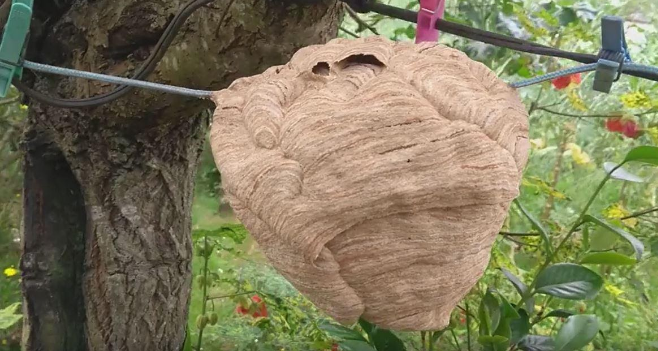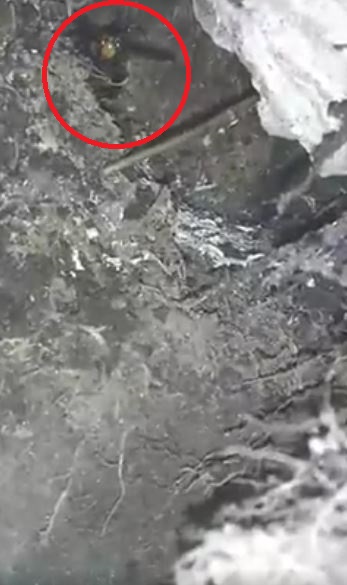Asian wasps (vespa velutina) getting closer to houses in towns and cities

Every season we receive the bad news from the written press, radio, television, and social networks ... Asian wasps (vespa velutina nigrithorax) every year causes deadly deaths in Spain.
Beekeepers do not have to be the main ones at risk of sting, but we can be anyone who is in an area surrounded by nature, in an urbanization in the mountains, in a second home, working in the work of field, picking fruit ... and even going for a run in the forest or cycling in the field.
There are multiple and varied places where we can find Asian wasp nests (each nest consequently inhabited by the queen and her workers who will not hesitate to attack us because they see us as a threat when we approach the nest of vespa velutina).
In this photo, we can see how a second summer residence can be a place where Asian wasps lay their nests. And no less than on the clothesline!

(Photos courtesy of SERPA, experts in removing vespa velutina with offices throughout Spain).
We also take the opportunity to launch a tip that we think is very important: before doing field work such as tilling or mowing the grass, you must first inspect the ground. This is because there are numerous cases in which the vespa velutina lays nests on the ground (mainly primary nests). It is extremely dangerous for people, because if we accidentally step on one of these nests, the Asian wasps will all come out in groups to attack us.
Here we can see how at first glance a nest at ground level is not seen but, instead, it is a nest inhabited by Asian wasps (1 queen and several workers).





(Photos courtesy of SERPA, experts in removing vespa velutina with offices throughout Spain).
This also applies to people who have a small farm, a vegetable garden, a second residence with a garden ... Before doing work such as tilling a field or clearing a garden, you have to carefully inspect the land for a few minutes.
A very valid advice is that if we see velutinas constantly going in and out of the same place (for example, a hole or indentation in the ground or in a projection) it is very likely that there will be a nest of vespa velutina nigrithorax. Then, we will have to proceed to call the competent authorities in the area (City Council, Local Emergency Services, etc.).
During this spring 2020, the velutins have had the opportunity to gain ground in areas not previously populated by the velutina, since due to COVID19 there have been two simultaneous factors that favor the Asian wasp spreading more fiercely throughout the territories: the people we have not had mobility and many have not gone to their second homes (they have not been able to do maintenance, they have not been able to detect primary nests in time and notify them to exterminate them and that they cannot become secondary, tertiary ...) and that most of the time, efforts and public resources have been destined mostly to fight against COVID19 and its consequences and adapt to the situation in each of their respective territories.
We firmly believe that all the City Councils of Spain will know how to measure up to prevent and fight the Asian wasp and will protect its inhabitants during this 2020 season.
It is essential to do a good job of professional trapping to stop the proliferation and advancement of vespa velutina throughout the national territory. This has to be done by the City Councils and local authorities in each area. At the same time, it is essential that at a particular level we also collaborate with the making of homemade traps and put them near our houses (in case of living surrounded by areas with forest and vegetation, urbanizations in the mountains, second residences, country estates, orchards, gardens ...) since everything adds up to slow down the advance of this invasive species.
For every queen we catch in the spring traps, around 20,000 Asian wasps will be prevented from hatching. We are aware that news will soon be presented regarding the design of Asian wasp traps, to respond to the real and urgent need to combat this pest from all fronts (we will keep you informed!). We hope that both in the beekeeping sector and other sectors have the appropriate support and tools to combat the plague of the Asian wasp and that both beekeepers and citizens of the various populations affected by vespa velutina nigrithorax can continue to do their daily activities with total security.
Mundoabejas.com Team








Comments
No comment at this time!
Leave your comment